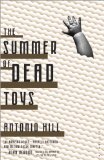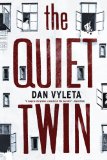Summary | Excerpt | Reviews | Beyond the book | Read-Alikes | Genres & Themes | Author Bio

A Mystery
by Michael GregorioChief among the many gifts the husband and wife writing team of Michael G Jacob and Daniela De Gregorio bring to this atmospheric thriller is the ability to deliver the
environment of Prussia's Baltic Coast in 1808 as a living, breathing, odiferous
locale. Indeed, it is fair to say I spent a good deal of the time reading this
novel with my nose wrinkled. But that is a good thing, since the effect not only
enhances a sense of place but brings the summer of 1808 to the forefront to the
extent that it becomes its own vibrant character. At the outset it interacts
with Magistrate Hanno Stiffeniis as he dodges flies attracted to the dung mounds
that clog the roads in his tiny hamlet. It even interferes with his wife
Helena's sleep when she dreams that one of those cursed flies has crawled into
her baby's mouth.
But that's just the beginning. Throughout, the hot weather, the frigid ocean,
the fetid air of neglect that pervades since the French have all but ravaged
Prussia intermingle with and alter the circumstances surrounding the grisly
murders Stiffeniis has been ordered to solve. With only rudimentary tools and
limited investigative resources he is forced to deal with elements that cloud
people's memories, natural environments – both outdoors and in – that blur or
obscure critical details and exhaustive, time-consuming travel conditions that
impede his progress at every turn. In all, between the mud, the waste, the offal
and the foods with questionable expiration dates, 1808 Prussia seems like the
last place anybody would want to conduct a murder investigation.
As if all that weren't enough, Magistrate Stiffeniis knows he has been set up
– if not to fail, at the very least to deliver a conveniently guilty Prussian
into the hands of Napoleon's army. One day he's collecting dung samples to
bolster his case that Napoleon's army is endangering the Prussian people's
health, the next he is en route to the coast by special request of a high ranking
French officer. The officer needs a scapegoat for the murder of a young Prussian woman
- the first in what becomes series of killings. His next in command, Colonel les Halles, is
afraid the murders will jeopardize his plans for glory via an amber-harvesting
machine that will displace the girls. The girls, at the bottom of this power
food chain and who previously just wanted to make some money and maybe escape
the hazardous job of mining for amber, now want to avoid being murdered
themselves. In the middle of all this Stiffeniis stands alone as a beacon of
enlightened thought who wants simply to get to the bottom of the
murders.
While the sights, sounds and smells of 1808 threaten to boil over, the
dynamic surrounding the two disenfranchised groups (the Prussians and the amber
mining girls) and the conquering French simmers on another storytelling burner.
The situation is further complicated by the fact that these are not the best of
the French forces - they have been reluctantly posted to Prussia in order to keep the Prussian rebels in check and acquire enough amber to finance Napoleon's efforts to subjugate Spain, so he can move on to Russia. So, in their own way, even the French soldiers are disenfranchised.
On the front burner the mystery of the murdered mining girls steps lively
amid the searing heat and the politics, taking a twist here, a turn or two there
– including a 19th Century slo-mo (by 21st Century
standards) chase and enough harrowing moments to keep a reader on the edge of
the seat.
![]() This review was originally published in The BookBrowse Review in April 2009, and has been updated for the
May 2011 edition.
Click here to go to this issue.
This review was originally published in The BookBrowse Review in April 2009, and has been updated for the
May 2011 edition.
Click here to go to this issue.

If you liked A Visible Darkness, try these:

by Antonio Hill
Published 2014
Gripping, sophisticated, and wickedly entertaining, The Summer of Dead Toys introduces a charismatic new detective and announces Antonio Hill as a new master of the crime thriller.

by Dan Vyleta
Published 2012
Vienna, 1939. Professor Speckstein's dog has been brutally killed, the latest victim in a string of unsolved murders. Speckstein wants answers - but these are uncharitable times, and one must be careful where one probes...
He has only half learned the art of reading who has not added to it the more refined art of skipping and skimming
Click Here to find out who said this, as well as discovering other famous literary quotes!
Your guide toexceptional books
BookBrowse seeks out and recommends the best in contemporary fiction and nonfiction—books that not only engage and entertain but also deepen our understanding of ourselves and the world around us.